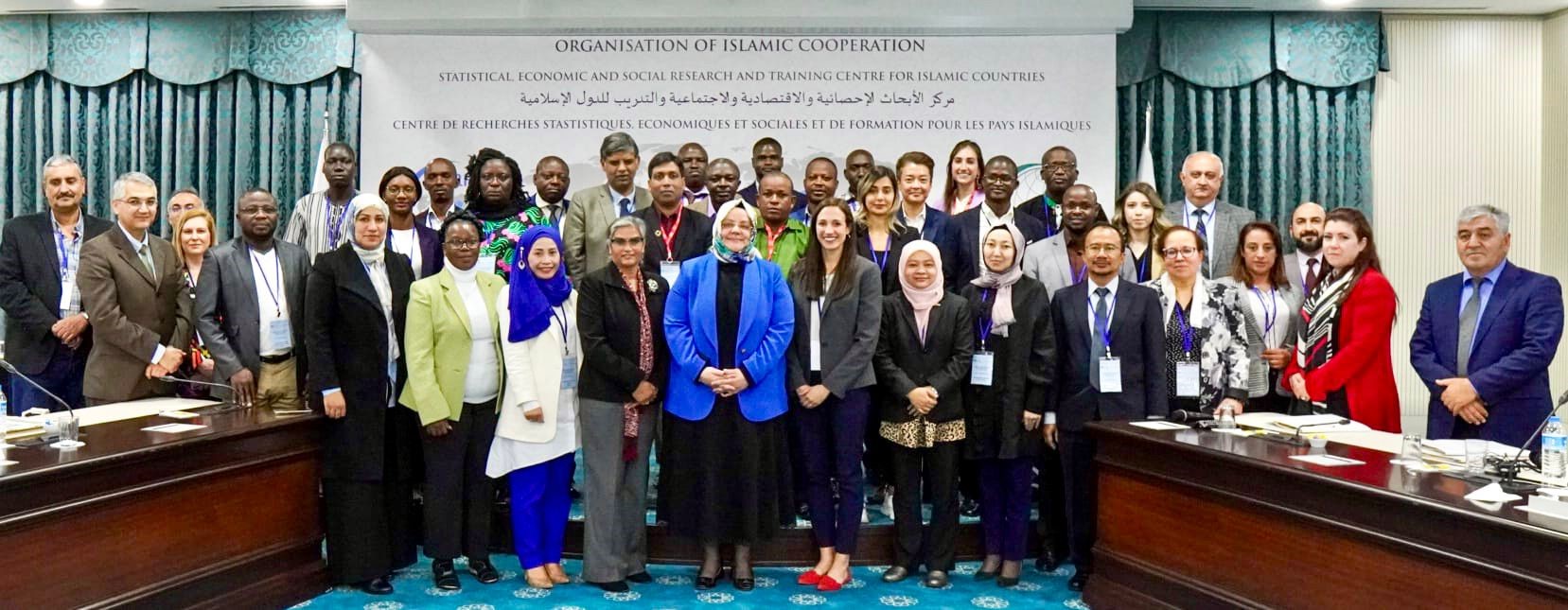Strengthening Tobacco Surveillance: Dynamic Partnership Between SESRIC, CDC, and the CDC Foundation
10.09.2023
Global
TQS, TQS-Youth
Statistical, Economic and Social Research, and Training Centre for Islamic Countries (SESRIC) Partnership with CDC and the CDC Foundation
In April 2014, Tobacco Questions for Surveys (TQS) was initially presented at the Fourth Session of the Organization of Islamic Cooperation (OIC) Statistical Commission, where the participating OIC countries affirmed their commitment to pursue integration of TQS into their ongoing surveys to monitor key tobacco control indicators among adults. This launched a long-standing partnership between the U.S. Centers for Disease Control and Prevention (CDC), the CDC Foundation, and SESRIC. SESRIC enhances regional- and country-level capacity for tobacco surveillance and monitoring, with the goal of sustaining tobacco control efforts in OIC member countries.
TQS and TQS-Youth are two components of the Global Tobacco Surveillance System and provide standardized questions on tobacco use for integration into adult and youth surveys for continuous monitoring. The integration of TQS and TQS-Youth is intended to enhance the capacity of countries to design, implement and evaluate tobacco control programs as outlined in the World Health Organization Framework Convention on Tobacco Control (WHO FCTC) through the MPOWER policy package.
Since the beginning of the initiative, 105 countries have completed incorporation of TQS questions into their adult surveys. As of May 2023, 16 OIC member countries have integrated TQS into their ongoing surveys and 2 OIC member countries have integrated TQS-Youth as part of the SESRIC TQS Integration Project.
100th Country/Site Completing a TQS Integration: TQS Palestine
Through the partnership with SESRIC, in 2021, Palestine conducted a standalone TQS, the Smoking and Tobacco Consumption Survey, making them the 100th site to integrate TQS questions into a survey. All 22 TQS questions covered topics such as tobacco product use, secondhand smoke exposure, and pro- and anti-tobacco messaging in the media.
The TQS survey results show that overall smoking rates among adults 18 years old or older increased from 23% in 2010 to 31% in 2021. Rates of tobacco use also varied by gender, region, age, and tobacco product. Men reported much higher smoking rates than women. About 54% of Palestinian men reported smoking, compared with 8% of women. In the West Bank, 67% of men reported smoking, compared with 12% of women. In the Gaza Strip, 33% of men reported smoking, compared with only 1% of women. More than a third of adult smokers were in the youngest age bracket (18-29 years), accounting for 40% of the total number of adults currently smoking.

The TQS data were used to advance several tobacco control initiatives within the state. Namely, the survey findings provided critical and timely evidence for several key program and policy actions: One, the development of a policy proposal to the Palestinian Ministry of Health for adopting a law banning smoking in public places to reduce exposure to secondhand smoke. Two, the survey results contributed to the development of educational programs, such as campaigns to reduce smoking prevalence among individuals and youth. Three, the data were critical to the opening of tobacco cessation centers by the Palestinian Ministry of Health to provide cessation services.
TQS-Youth Orientation Workshop in Ankara, Türkiye
In early May 2023, members of the Global Tobacco Control Branch at CDC, along with the CDC Foundation, traveled to Ankara, Türkiye to attend a TQS-Youth Workshop hosted by SESRIC.
The workshop brought together 43 delegates from the National Statistical Offices (NSOs), Ministries of Health, and Ministry of Youth of 18 OIC member countries. These delegates were provided with insights on incorporating TQS-Youth into their ongoing national surveys focused on youth-related matters. The workshop covered various topics, including integrating TQS-Youth questions, data analysis, report preparation, and the dissemination of survey findings.
During the workshop, Mali and Niger shared their experiences successfully integrating TQS-Youth questions into their respective national surveys. Mali integrated these questions into its Modular and Permanent Household Survey (EMOP) in 2021, while Niger incorporated them into its Harmonized Survey on Living Conditions of Households between 2021 and 2022. Palestine also presented their experience in conducting the Smoking and Tobacco Consumption Survey in 2021. Additionally, the workshop provided a forum for representatives from NSOs and Ministries to share their views on opportunities to integrate TQS-Youth questions into surveys they are conducting along with other national practices in measuring and reporting tobacco use among young people.

TQS-Youth Success Stories from the Field: Mali and Niger
The partners are grateful to Mali and Niger for successfully implementing TQS-Youth into national surveys, respectively:
- Modular Permanent Household Survey, 2021.
- Harmonised Survey on Living Conditions of Households (HSLC) 2021/2022.
Niger and Mali were the first countries to integrate TQS-Youth, and their achievement has served as inspiration for other OIC member countries to integrate TQS-Youth into their own national surveys. Data from both countries can be found on SESRIC’s website.
When asked to share challenges from integrating TQS-Youth, Niger described cultural differences as an obstacle when surveying youth. “Sometimes interviewers are confronted with social obstacles in the field, especially when it comes to isolating a respondent [from a parent or guardian to ensure privacy] to administer the questionnaire on smoking.” In Mali, identifying eligible youth presented as a challenge, and to address this Mali suggested that “questions from the TQS-Youth survey should be integrated into household surveys to maximize eligibility.”
Niger and Mali both reported great success in integration, surveying a combined estimate of 10,000 households, and provided several points of advice to other countries considering implementing TQS-Youth. Both countries agreed that time and care should be taken when planning integration of the questionnaire into the parent survey, including the length of the questionnaire for better retention. Particularly, they emphasized that training staff and field interviewers on the theoretical and practical aspects of data collection was key to ensuring satisfactory and consistent results. Mali advised that “a better understanding of the structure of the different questions and the concepts covered” was key. Lastly, both countries advised that care is taken to ensure that the survey covers a representative sample of youth.
The dynamic partnership between SESRIC, CDC, and the CDC Foundation continues to strengthen global tobacco surveillance among the OIC member countries and surrounding areas. Over the last nine years, the partnership has been able to support OIC member countries in their integration of TQS and TQS-Youth into national surveys to use and disseminate the data to support tobacco control efforts, including implementation of policies that promote tobacco free lives for children and families. The SESRIC TQS and TQS-Youth Integration Project is an example of a successful, ongoing global tobacco surveillance partnership. This blog has spotlighted only a fraction of the incredible progress made towards tobacco control, with many more success stories and relevant data to come from TQS and TQS-Youth. The authors would like to thank Nenden O. Shanty of SESRIC for her contributions to this blog. Special thanks are given to Mali, Niger, and Palestine TQS country-teams for their insight and contributions to tobacco control research. The authors acknowledge Brandy Maddox, Gibril Njie, Jeremy Morton, and Indu Ahluwalia of CDC for their review.